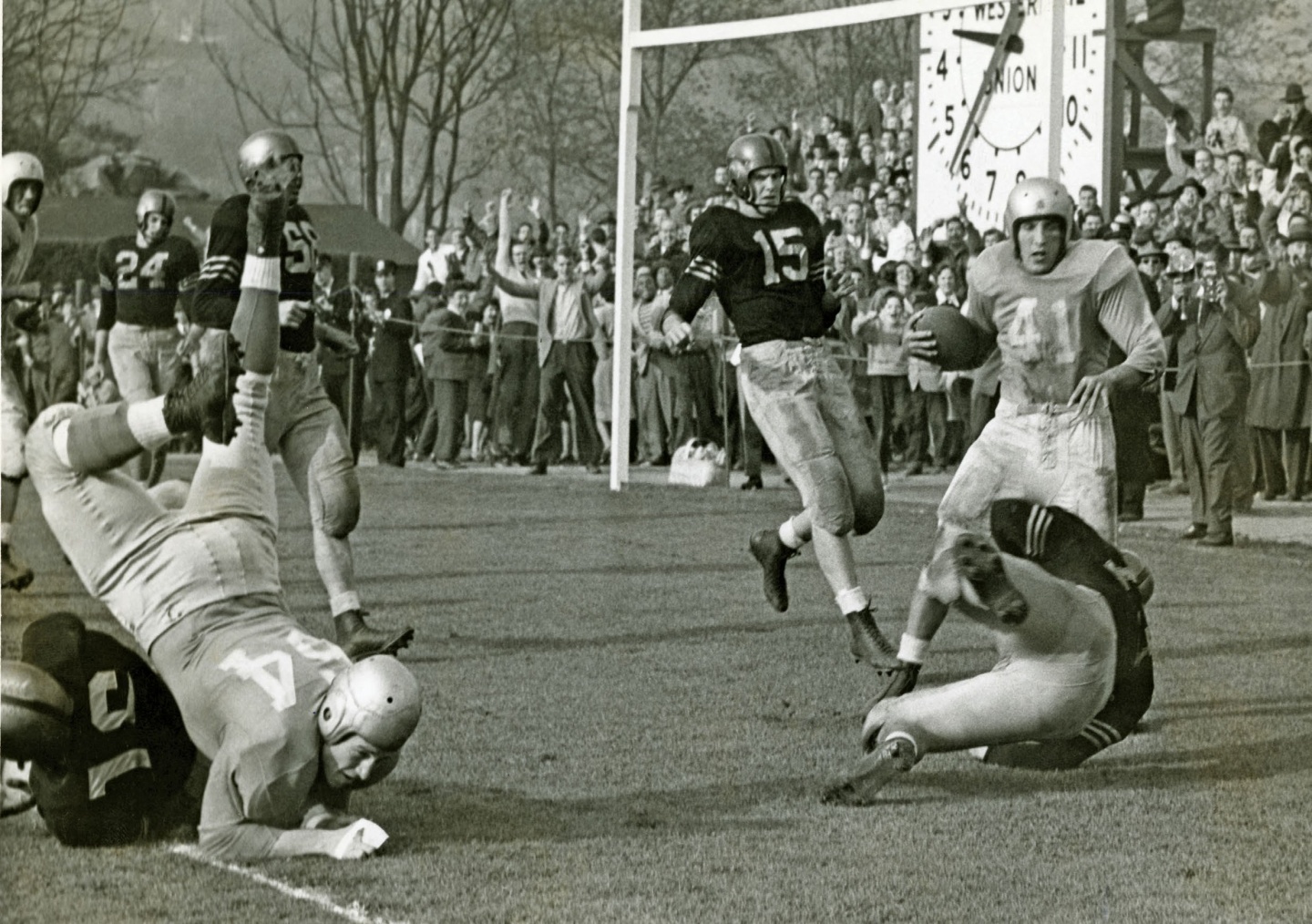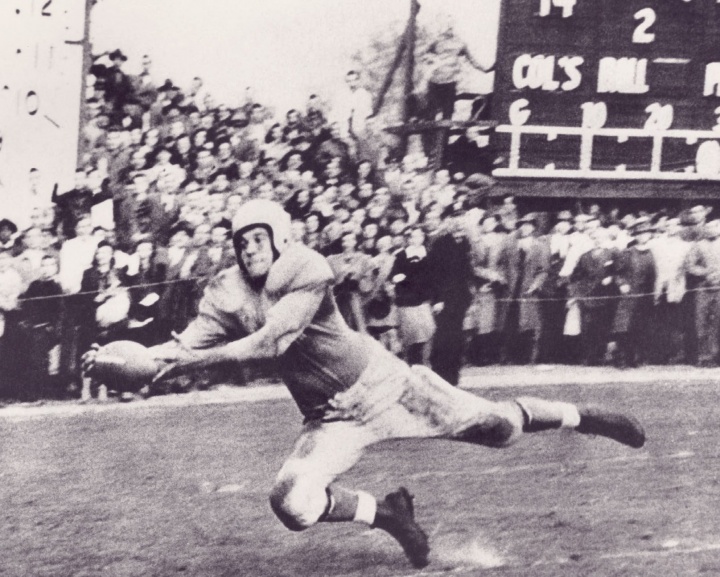Footballer Al Kachadurian BUS’48 looks back on Columbia’s timeless triumph over Army
Columbia College | Columbia University in the City of New York
Footballer Al Kachadurian BUS’48 looks back on Columbia’s timeless triumph over Army
One morning this past summer, Al Kachadurian BUS’48 sat at a dining table in the senior living center he’s called home for the last 15 years and watched a video of a football game played 76 years ago. It was in black and white, the quality spotty and with no narration. But every few seconds Kachadurian would lean in and say, “There I am.”

Al Kachadurian BUS’48
PHOTOS COURTESY COLUMBIA UNIVERSITY ARCHIVES
When he wasn’t spotting his own number, Kachadurian was reliving the crunching tackles he and his teammates made that day. “Don’t forget: no face masks and no mouthpieces,” he reminded a visitor viewing alongside. “And we hit as hard as hell. We didn’t care; when you’re that age, you don’t give a damn.” Later, he watched as quarterback Gene Rossides ’49, LAW’52 dodged Army tacklers for a key first down. And, like the 35,000 fans packing Baker Field that afternoon, Kachadurian admired once more the swooping fourth-quarter receptions made by Bill Swiacki BUS’48 that would be talked about for years. “He made a lot of great catches,” Kachadurian said.
What he really wanted to see, though, was his interception — a play that helped secure one of the great upsets in college football history: Columbia 21, Army 20.
Kachadurian watched this video a few weeks after he had turned 100, on May 12. The day before his birthday, his teammate on defense Robert Lincoln ’49 had died at 96. With Lincoln’s passing, according to Columbia Athletics, Kachadurian was likely the last surviving member of the famed team.
He had taken a circuitous route to Columbia, which wasn’t unusual for players of that era. Like several of his teammates, Kachadurian served during WWII. An all-state quarterback as a high school senior in Paterson, N.J., Kachadurian played one year at Lafayette College before enlisting in the Navy. He was stationed on a ship in the Brooklyn Navy Yard when the war ended. At the request of his wife, Janet, Kachadurian decided to stay close to his New Jersey home to finish college. One day, before the 1946 season, he made an unannounced visit to the Upper West Side apartment of legendary Columbia coach Lou Little. “I introduced myself and he said, ‘Let me see your grades at Lafayette,’” Kachadurian recalled. “My grades were good — not great but good. I showed him my credentials and he said, ‘OK, I’ll see if I can get you in.’” A week later, Kachadurian was enrolled as an undergraduate in the Business School.
Kachadurian knew playing for Little could pay off; the coach had elevated the football team’s national profile after coming to Columbia in 1930. First came a 7–0 upset of mighty Stanford in the 1934 Rose Bowl. Then, with his revolutionary wing-T offense, he helped mold quarterback Sid Luckman ’39 into a future Hall of Famer. At times, Columbia was even ranked among the top football schools; early in the 1947 season it had risen to number 11.

Lou Kusserow ’49 (#41) scores Columbia’s first touchdown against Army; it was the first time in 1947 the Cadets’ goal line was crossed.
But few gave Little and his Lions much of a chance when they faced the Cadets, a powerhouse during the war years. A year earlier, Army had run over the Lions 48–14. “They beat the crap out of us,” Kachadurian put it bluntly. Still, Baker Field sold out. Among the fans was Janet, who used one of four tickets given to players. “‘You come in with one ticket and sell the other three,’” Kachadurian recalled telling his wife. “I was living with my in-laws. We needed the money.”
Through the first half, Janet and the Columbia faithful had little to cheer. Army led 20–7. But during halftime, quarterback Rossides, who would go on to hold positions in two White House administrations, exhorted his teammates. “I just said, ‘We can do this; we gotta do this,’” Rossides recalled in a 2013 interview. “I went around the room to the players, these veterans who are three and four years older than me.”

Bill Swiacki BUS’48 makes “The Catch” that would be talked about for years.
Kachadurian didn’t head back to Morningside Heights for the post-game celebration, where, according to Spectator, “a sizeable aggregation of celebrants held libations nightlong” at the popular West End bar. He had a family at home. “I was the only married guy on the team,” Kachadurian said. (He and Janet, who died in 2011, later had two more children.) Graduation came the following spring, as did a couple of NFL offers, but they didn’t pay enough. Eventually Kachadurian took over a family business. He kept up with many of his old teammates, and recalled that at one reunion Rossides spotlighted him. “I’m bragging a bit, but he said one of the reasons Columbia had a great team in ’47 was our defense,” said Kachadurian, who had a team-high six interceptions that season.
All these years later, he has not lost his competitive spirit. He’s on a bocce team in his New Jersey senior living community; they play a few times a week. And, as he keeps watching the video of the Army win, he keeps searching for his interception; it stopped an Army scoring drive.
He never spots the play. It doesn’t matter. The memory remains fresh.
Charles Butler ’85, JRN’99 is a journalism professor at the University of Oregon. He is researching a book on Lou Little.

Published three times a year by Columbia College for alumni, students, faculty, parents and friends.
Columbia Alumni Center
622 W. 113th St., MC 4530, 6th Fl.
New York, NY 10025
212-851-7852
cct@columbia.edu

Columbia Alumni Center
622 W. 113th St., MC 4530, 4th Fl.
New York, NY 10025
212-851-7488
ccalumni@columbia.edu